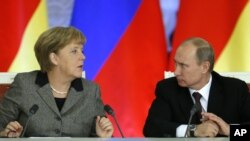MOSCOW —
Russian President Vladimir Putin has dismissed criticism from German Chancellor Angela Merkel on his country's human rights record.
Putin met with Merkel Friday at a Russian-German business forum in Moscow. Last week, before Merkel traveled to Russia, Germany’s parliament passed a resolution that linked a crackdown on freedoms here to Putin’s unprecedented third term as president. As a result, parliament asked Merkel to take a tough stance with Putin on Russia's human rights record.
Merkel followed parliament's advice and raised questions about the sentences given to two members of the all-female punk band, Pussy Riot, which had staged a performance in Moscow's most prominent Orthodox cathedral, calling on the Virgin Mary to deliver Russia from Putin. The two women in question were sent to penal colonies after being convicted of hooliganism motivated by religious hatred.
Merkel said not every criticism should be understood as destructive. She said she is bothered by the fact that a number of laws have been adopted recently in Russia and that she cannot see them as promoting free groups.
Merkel added that being sent to a penal colony would have never happened in Germany.
Putin said Merkel does not have all the facts.
He said that concerning political and ideological issues, Russia listens to its partners, but they hear about what is going on from far away. Putin went on to say that Chancellor Merkel brought up the Pussy Riot bandmembers who were imprisoned for their performance in a church, but asked if she knew that, before that, one of them hanged an effigy of a Jewish person and said 'Moscow ought to be rid of these people.' He said Russia cannot support people who have an anti-Semitic position.
Putin was referring to a 2008 performance art demonstration in which dolls representing homosexuals, migrant workers and Jewish people were hanged from nooses. Those connected with the exhibition say it was meant to show support for those groups.
Since Putin took office in May, non-governmental organizations that received foreign funding and participate in political activities are now required to register as foreign agents, a term that dates back to Soviet times. Additionally, those who participate in and organize unsanctioned protests against the Kremlin face steep fines.
The Kremlin has consistently maintained that its laws are meant to protect the average Russian and dismisses criticism that Russia has a dismal human rights record.
Putin met with Merkel Friday at a Russian-German business forum in Moscow. Last week, before Merkel traveled to Russia, Germany’s parliament passed a resolution that linked a crackdown on freedoms here to Putin’s unprecedented third term as president. As a result, parliament asked Merkel to take a tough stance with Putin on Russia's human rights record.
Merkel followed parliament's advice and raised questions about the sentences given to two members of the all-female punk band, Pussy Riot, which had staged a performance in Moscow's most prominent Orthodox cathedral, calling on the Virgin Mary to deliver Russia from Putin. The two women in question were sent to penal colonies after being convicted of hooliganism motivated by religious hatred.
Merkel said not every criticism should be understood as destructive. She said she is bothered by the fact that a number of laws have been adopted recently in Russia and that she cannot see them as promoting free groups.
Merkel added that being sent to a penal colony would have never happened in Germany.
Putin said Merkel does not have all the facts.
He said that concerning political and ideological issues, Russia listens to its partners, but they hear about what is going on from far away. Putin went on to say that Chancellor Merkel brought up the Pussy Riot bandmembers who were imprisoned for their performance in a church, but asked if she knew that, before that, one of them hanged an effigy of a Jewish person and said 'Moscow ought to be rid of these people.' He said Russia cannot support people who have an anti-Semitic position.
Putin was referring to a 2008 performance art demonstration in which dolls representing homosexuals, migrant workers and Jewish people were hanged from nooses. Those connected with the exhibition say it was meant to show support for those groups.
Since Putin took office in May, non-governmental organizations that received foreign funding and participate in political activities are now required to register as foreign agents, a term that dates back to Soviet times. Additionally, those who participate in and organize unsanctioned protests against the Kremlin face steep fines.
The Kremlin has consistently maintained that its laws are meant to protect the average Russian and dismisses criticism that Russia has a dismal human rights record.




